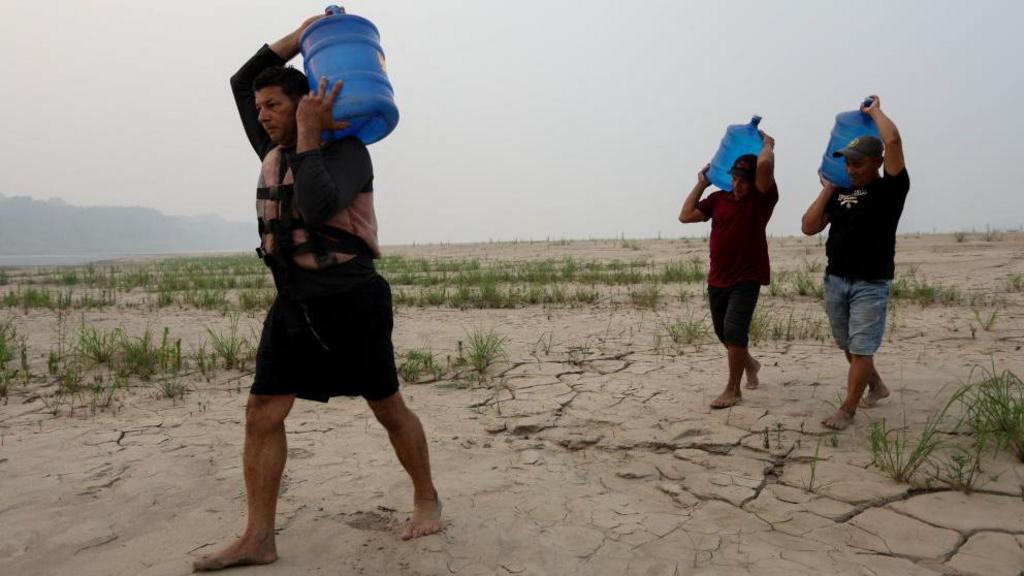“`html
A recent United Nations-backed report reveals that the past two years have witnessed some of the most devastating droughts in recorded history, stretching from Somalia to mainland Europe, with climate change identified as a key exacerbating factor.
The report characterizes drought as a “silent killer” that “creeps in, drains resources, and devastates lives in slow motion,” emphasizing its role in intensifying issues such as poverty and ecosystem collapse.
The assessment underscores the widespread impacts across Africa, the Mediterranean, Latin America, and Southeast Asia, noting that an estimated 4.4 million people in Somalia faced crisis-level food insecurity at the start of this year.
The report urges governments to prepare for a “new normal” by implementing measures such as enhanced early warning systems.
“This is a slow-moving global catastrophe, the worst I’ve ever seen,” stated Dr. Mark Svoboda, co-author of the report and founding director of the US National Drought Mitigation Center.
“This report underscores the need for systematic monitoring of how drought affects lives, livelihoods, and the health of the ecosystems that we all depend on.”
The “Drought Hotspots Around the World” report pinpoints the regions most severely affected from 2023 to 2025.
During this period, the report notes that the warming effects of climate change were amplified by El Niño, a natural climate phenomenon known to influence global weather patterns.
El Niño occurs when surface waters in the eastern and central tropical Pacific Ocean experience unusually warm temperatures.
This often results in drier conditions in regions including southern Africa, parts of Southeast Asia, northern South America, and southeastern Australia.
The report also acknowledges that human pressures, such as irrigation practices in agriculture, have placed additional strain on water resources.
By January 2023, the Horn of Africa was grappling with its worst drought in 70 years, following consecutive years of failed rainy seasons in Kenya, Ethiopia, and Somalia.
This followed the deaths of an estimated 43,000 people in Somalia in 2022 from drought-linked hunger.
The crisis has also impacted African wildlife, with hippos in Botswana stranded in dry riverbeds and elephants culled in Zimbabwe and Namibia to provide food for communities in need and prevent overgrazing.
The report highlights that the world’s most vulnerable populations, particularly women, are disproportionately affected by drought, leading to widespread societal impacts.
Instances of forced child marriages more than doubled in four regions of Eastern Africa hardest hit by drought, as families struggled to secure dowries to ensure their survival, the report noted.
“The coping mechanisms we saw during this drought grew increasingly desperate,” said lead author Paula Guastello. “Girls pulled from school and forced into marriage, hospitals going dark, and families digging holes in dry riverbeds just to find contaminated water – these are signs of severe crisis.”
While low- to middle-income countries have borne the brunt of the devastation, the report cautions that no nation can afford to be complacent, pointing to how two years of drought and record heat halved Spain’s olive crop.
In the Amazon basin, record-low water levels resulted in fish die-offs and increased the risk to endangered dolphins, while also impacting drinking water supplies for hundreds of thousands of people.
Drought even affected world trade, with water levels in the Panama Canal falling so significantly between October 2023 and January 2024 that daily ship transits decreased from 38 to 24.
“Drought is not just a weather event – it can be a social, economic, and environmental emergency,” said report co-author Dr. Kelly Helm Smith.
“The question is not whether this will happen again, but whether we will be better prepared next time.”
Sign up for our Future Earth newsletter to keep up with the latest climate and environment stories with the BBC’s Justin Rowlatt. Outside the UK? Sign up to our international newsletter here.
The garden will feature 300 species, each selected for their climate resilience and biodiversity.
More than 50,000 people have been evacuated from wildfires in Turkey.
Scientists are clear that global warming is making heatwaves like this hotter and more likely.
Andrew Muir announces an independent group, including farmers, will evaluate the controversial Nutrients Action Plan (NAP).
A new heat record for June of 46C was set in Spain this weekend as Europe experiences an intense heatwave.
“`

